Reviews
A Plastic Nightmare
Sandor Stern
Canada, 1989
Credits
Review by Jonathan Foltz
Posted on 19 October 2010
Source Netflix VoD
Categories 31 Days of Horror VII
URSULA
Leon! You frightened me! I thought you were Pin!LEON
And why should Pin frighten you?
All horror films are at some level dark hymns to the body. Peopled with deformed monstrosities and filled with blood and gore, horror films remind us that our bodies are strange, unsettling vessels of morbid desire and looming injury. These and other obscene mysteries of the body are on center stage in Sandor Stern’s seriously oedipal creep-fest Pin, though not primarily in the usual constellation of nudity and gaping wounds. Instead, they are visible in the form of the film’s titular icon, Pin (short for Pinocchio), an anatomically correct doctor’s dummy. While most horror films assert the subversive agency of bodily excess and violation, the subject of Pin is a model of repressive fantasy: his body is instructively transparent, ordered, and pristinely devoid of blood. Yet in the obsessive and delusional world of the film, this lifeless, artificially purified body is shown to be weirdly more terrifying—not for anything it does, nor for any violence it inflicts, but because of the consuming psychosexual horrors it inspires in the mind of one young man determined not to grow up.
Following closely on the heels of Mannequin the previous year, which gave to human-dummy films their first romantic comedy cum Egyptian spirit-possession fable, Pin attempts give the genre its Psycho, its Hamlet, or its Fall of the House of Usher. This aesthetic ambition largely plays to the films strengths, although for obvious reasons it can’t suppress the basic absurdity of the film’s premise. The result is an unforgettable and uncomfortable mix of tittering humor and self-destructive desire. Pin is the story of two siblings, Leon and Ursula, who grow up under the watchful eye of their fastidious, cold, and distant parents, and whose adult lives are haunted by the grim embodiment of their sexual taboos. As children, the furniture is perennially embalmed in plastic covers; the kids wear bibs to every meal, after which the floor is promptly vacuumed. This atmosphere of lifeless sterility makes the parents seem like strange asexual robots. As the young Ursula remarks to Leon after learning about “the birds and the bees” (about which more later), “I’ll bet you before they do it mother washes his penis with spick and span!” So there are mother issues aplenty, but the real bugaboo in Pin is their demanding, logical father (played by Terry O’Quinn), a physician whom Leon and Ursula tellingly call only “doctor.” In his office, he keeps his trusty but inanimate teaching aide, Pin, which the amateur ventriloquist doctor uses to teach children about the human anatomy (note the conspicuous white towel draped over his lap!) but also, clearly, to make the visits fun—you know… for kids!
The problem is that Leon is under the delusion that Pin is a real being, a delusion that takes on full symptomatic form when he catches one of his father’s nurses in flagrante dilecto, pleasuring herself with Pin’s anatomical “correctness,” his mechanical head bobbing hypnotically on her bosom as if in pain. This is a bad sign for young Leon, but in truth he already seemed dangerously attached to the kindly dummy. After one doctor’s visit early in the film - during which the permanently naked Pin complains that “It gets cold sitting here naked all the time!” - Leon tries to comfort him.
LEON
Maybe if you just asked father for some clothes, he would give some to you.PIN
If I wore clothes then no one could see inside me and I wouldn’t be good for teaching anymore.LEON
Well, couldn’t you take them off when you had to?PIN
I couldn’t do it myself and it would be too much extra work for the doctor.LEON
I could come by and do it for you!
Exchanges like this one ought to have raised at least a modicum of parental concern. Still, when Ursula is caught pondering the images of a Playboy, the “doctor” thinks it will be a good idea for Pin to explain the wonders of sex. Pin’s lecture is predictably clinical, dry, and to the point, but after his initial explanation of the “biological need” that nature instills in us so that we can grow “thirsty for sex” in the same way that one might get thirsty for water, the doctor decides to have Pin hammer the point home: “Alright, let’s begin with the male sexual apparatus. Leon, take the towel off my lap… Leon, do it!” It’s hard to capture the appropriate tone of these scenes on paper—the dialogue reads too easily as over-the-top psychoanalytic fodder. On screen, however, Leon’s childhood traumas are presented with a disarming matter-of-factness, and the film’s lingering feeling of tonal dissonance is part of the key to its magic, which casts suburban bourgeois normalcy as the epitome of the perverse. Leon becomes a psychopath, we understand, not because he has contempt for human life, but because he is foolish enough to believe the protective lies his parents tell him.
Flashing forward to Leon’s senior year of high school, we spend the rest of the film watching his childhood trauma bear fruit. The now sexually promiscuous Ursula finds herself pregnant, and Leon somehow convinces her to go to Pin for advice. Ursula, who is perfectly aware that Pin is fake, seems to go along with Leon in order to humor him, but is surprised to find out that Leon now capable of his father’s ventriloquism. (In the world of Pin, skill at ventriloquism is tantamount to a kind of illicit sexual knowledge. “When did you learn how to do that?” she asks him after they leave. “Do what? God it was so incredible!”) But after the “doctor” performs an abortion on Ursula (“Aren’t you going to observe, Leon?”), the parents (and then Aunt Dorothy) die under mysterious, Pin-related circumstances. Now Leon’s plastic friend wheels prohibitively around the house wearing “father’s clothes” - and, later, sporting a disturbing all-too-skin-like mask that is presumably meant to humanize him - terrorizing Leon’s would be sexual partners and spooking Ursula’s sweet new boyfriend, Stan. In an amazing sequence that is perfectly emblematic of the film’s weirdo drama, Leon invites Stan over to an awkward dinner-party so that he can “meet Pin” (Ursula’s demure, “I don’t think Stan is ready to meet Pin,” is an understatement if I ever heard one). After dinner, Leon gathers everyone in the living room to read from his “poetry”—which concerns a hero named “Testes” who is described as “a sort of modern day Beowulf out to gain immortality by creating a much progeny as he can”! Needless to say, Leon’s poetry reads like the pornographic transcript of the subconscious desires that he is incapable of acknowledging in life. A brief snippet says it all: “…He stopped abruptly. It was as if a knife had performed an instant castration—he was looking into the eyes of his sister!” But Leon is no liberated de Sade, and when he finds out that Stan was only being polite about enjoying said poetry (and thinks Leon should seek psychiatric help), Leon flips into a Pin-addled rage.
It goes without saying that Pin is the most awkward kind of movie ghoul: the inanimate kind. (The director, Sandor Stern, also helmed the infamous Amityville Horror 4 about the demonic lamp). Watching Pin move vaguely through the screen after his terrified prey is consequently a painful exercise in the suspension of disbelief. It is the sort of spectacle that could only ever be potentially frightening when framed by the camera. In other words, the threat of violence is always touched by our sense of its imaginary quality. What’s frightening is the possessive fantasy animating the violence, not the violence itself. The film is careful to reign in the possibility that Pin has actually come alive, Chucky-style: Leon clearly holds the strings throughout the film. For Pin, the real horror isn’t the supernatural or the satanic, it’s the banal terror of adult sexuality. In the grips of the “need,” the film asserts, we all become puppets of sorts, reduced to naked, humiliated appendages scarcely different from Pin himself.
More 31 Days of Horror VII
-

The Thin Blue Line
1988 -
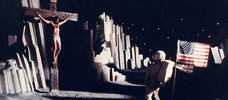
The Ninth Configuration
1980 -
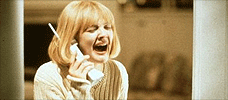
Scream
1996 -
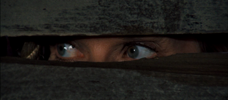
Dying Room Only
1973 -
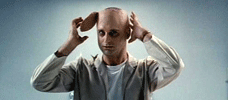
Brain Dead
1990 -
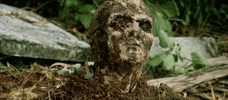
Zombi 2
1979 -
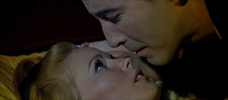
Dracula Has Risen from the Grave
1968 -
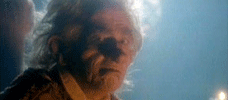
The Storyteller
1988-1989 -
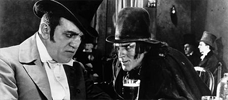
Dr. Jekyll and Mr. Hyde
1920 -
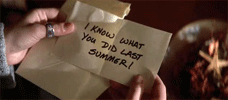
I Know What You Did Last Summer
1997 -
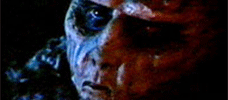
Don’t Be Afraid of the Dark
1973 -
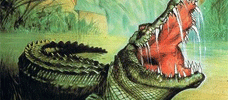
Dark Age
1987 -
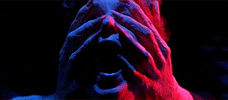
Inferno
1980 -
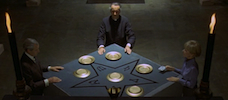
To the Devil a Daughter
UK / West Germany -
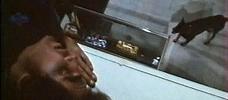
Trapped
1973 -
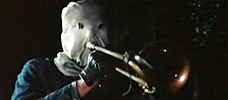
The Town that Dreaded Sundown
1976 -
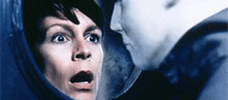
Halloween H20: Twenty Years Later
1998 -

Killdozer
1973 -
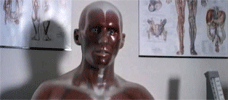
Pin
1989 -
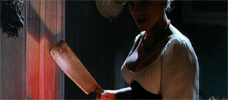
Frankenstein Created Woman
1967 -
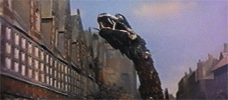
Reptilicus
1961 -
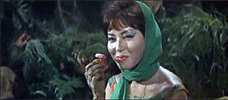
Matango
1963 -
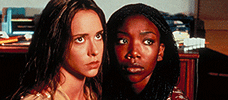
I Still Know What You Did Last Summer
1998 -
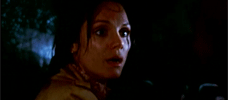
Night Terror
1977 -
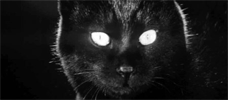
Kuroneko
1968 -
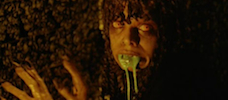
Demons
1985 -
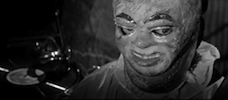
Paranoiac
1963 -
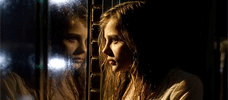
Let Me In
2010 -
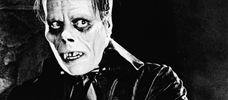
The Phantom of the Opera
1925
We don’t do comments anymore, but you may contact us here or find us on Twitter or Facebook.



